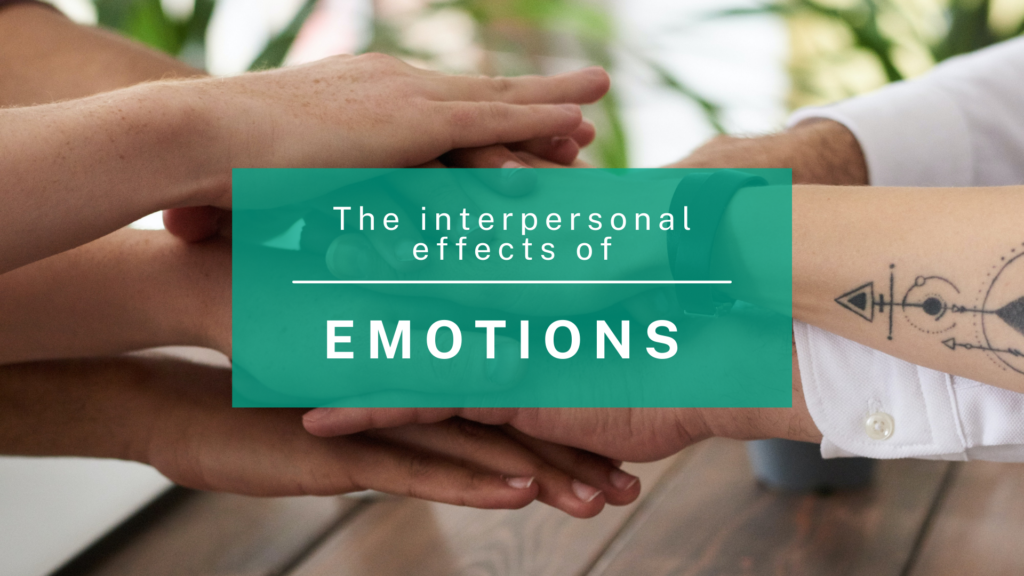The impact that a person’s emotional experience or expression may have on others depends on a few factors. Here’s a brief overview of some of the things that might make a difference.
The level of interdependence of the people involved
If the person perceiving the other’s emotions has no relationship with them, and no intentions of creating one, then the person is unlikely to be affected by the other’s emotional experience. If we see someone in a public place behaving in a way that indicates they are angry or sad, but that emotion is not directed towards or caused by us or someone we care about, we may be able to proceed without their emotion having any impact on us. In a conflict situation, the level of interdependence between the people involved will depend on how much they need to negotiate with one another, and whether they have good alternatives.

The justifiability / authenticity of the emotion expression

Whether or not we are impacted by another person’s emotion depends on whether we think the emotion is justified (appropriate for the circumstances) and authentic (the person is not pretending to feel something). If someone gets really angry towards us for something that we think is really trivial, we may decide that they are outrageously overreacting and be able to ignore their emotional expression. Similarly, if we think that someone is “making up” their emotions for a particular purpose, we are unlikely to react to that emotion (or at least, not react in the way they may be hoping).
Whether the person’s behaviour is consistent with the emotional expression
This factor can have two different underlying causes. The first links to the previous point: if the person’s behaviour is inconsistent with the emotion they are expressing, then we are likely to assume that the emotion is not authentic. For example, if someone is expressing gratitude, but is behaving in a selfish way, we will probably discount the gratitude as self-serving and not genuine. The second way this might matter is that if the person’s behaviour is serving us, for example they are being helpful towards us even though they are expressing anger, we may be able to live with their emotions.

What the emotion is directed towards

We are likely to respond quite differently towards someone who expresses an emotion towards a situation, compared with someone who expresses an emotion at us personally. For example, if someone expresses frustration at the difficulty of the task at hand, we may be able to acknowledge their frustration. However, it’s quite different if they direct their frustration at us for some reason, such as not being cooperative enough, or not working hard enough to help complete the task. Our response will be quite different whether we are perceived as the cause of the emotion, or the target of the emotion, or merely observing a person’s expression of emotion.
The intensity of the emotion
Our response to another’s expression of emotion, especially if directed towards us, will depend a great deal on the intensity of the emotion. Compare how you would feel if your friend was mildly frustrated with you, or furiously angry with you. This can also work with emotions we think of as positive or prosocial. If a work colleague was too enthusiastic about how much they liked you, you’d probably feel a little bit uncomfortable (unless, of course, the feeling was reciprocated)!

Whether the people involved are distracted from others’ emotions

If we are stuck in a quiet room with someone who is overtly expressing their emotions, this is likely to be hard to ignore, and will have more of an impact on us than if we are in a busy public place where there’s lots going on around us. We may also be distracted by internal distractors (how we are feeling, or something else that’s preoccupying our thoughts). Distractions can be useful as a regulation tool in conflict – sometimes they happen naturally, but we can also consciously distract ourselves from emotions that are unhelpful.
The number of people involved
We may respond quite differently to a person’s emotion if it is expressed to us in private, compared with in front of our whole team. It also makes a difference whether the emotion is expressed by an individual or by a group. There is significant research about group-based emotions and how they can impact on large scale conflicts.

The time pressures involved

We may respond differently to others’ emotions if we have more or less time available to achieve our goals in the situation. If we are in a hurry, we may be willing to “look the other way” when someone expresses an emotion for the sake of continuing to move towards an urgent goal. However, if we have more time we may be willing to engage more specifically with the others’ emotions.
The cultural expectations of the people concerned
People from different cultures vary in the way they might respond to expressions of certain emotions. For example, in many Western countries, expressions of anger (so long as not too intense and seen as suitable for the context) are accepted and seen as natural when certain events occur. However, in other non-Western cultures expressions of anger are seen as immature and inappropriate in almost all situations. Our individual responses to others’ emotions will be informed by our cultural expectations.

Would you like to know more about how emotions impact on conflict and conflict resolution?

Would you like to learn strategies to support people to respond effectively to other people’s emotions so that they can engage in conflict in a constructive way?
Check out CCI Academy’s new Working with Emotions in Conflict fully flexible online course. It includes over 20 hours of video lessons, plus additional written content and activities to apply your learning.
We are also offering you the opportunity to try Module 1 of the course (including over two hours of video content about Understanding Emotions and a downloadable workbook) for just $97 so you can try it out before committing to the whole course. Click here to access this special trial offer: https://conflictmanagementacademy.com/trial-module1-wwe
